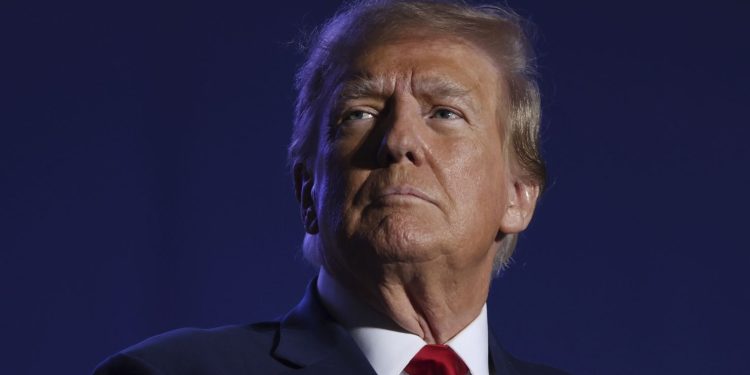In a groundbreaking decision, the Colorado Supreme Court has ruled that former President Donald Trump is ineligible to serve as US president due to his actions that incited the January 6, 2021 attack on the US Capitol. The ruling, which is now headed for the US Supreme Court, marks the first time a court has declared that Trump’s efforts to overturn the 2020 election results disqualify him from running for public office under the post-Civil War-era provision of the US Constitution.

Photographer: Andrew Harrer/Bloomberg
The Colorado Supreme Court issued the ruling on Tuesday, effectively barring Trump from the state’s upcoming March 5 primary ballot. However, the court has temporarily stayed the decision to allow Trump to appeal, giving him until January 4 to do so. The court’s 4-3 ruling, delivered by all seven justices appointed by Democratic governors, emphasized the indisputable nature of Trump’s direct and voluntary efforts to incite his supporters to march on the Capitol in an attempt to prevent the certification of the 2020 presidential election and disrupt the peaceful transfer of power.
The ruling has significant implications for Trump’s political future as he plans a potential rematch against President Joe Biden in the 2024 election. Trump currently holds a commanding lead in the Republican primary and casts himself as a dominant force in American politics. However, the court’s decision raises questions about his eligibility and the possibility of legal challenges in other states that have also seen lawsuits invoking the 14th Amendment’s provision on insurrectionists being barred from holding office.
Notably, Trump’s campaign has announced its intention to appeal the ruling and seek a stay to prevent it from taking effect. This move could extend the timeline for a final decision, depending on whether the US Supreme Court agrees to hear the case. The court has directed Colorado’s Secretary of State to keep Trump’s name on the presidential primary ballot until a final resolution is reached.
The ruling has sparked strong reactions from both sides of the political spectrum. Trump’s campaign issued a statement accusing Democratic Party leaders of attempting to impede his growing popularity and prevent his potential return to office. Meanwhile, the advocacy group Citizens for Responsibility and Ethics, which brought the case forward, argued that Trump’s actions violated the oath to support the Constitution and should disqualify him from serving in government.

While the Colorado Supreme Court acknowledges the weight and complexity of the case, it asserts that the evidence presented clearly demonstrates Trump’s role in inciting the attack on the Capitol. The ruling could have far-reaching implications not only for Trump’s political ambitions but also for the wider debate surrounding accountability for public officials and the boundaries of free speech in the context of incitement.
As the case now heads to the US Supreme Court, legal experts anticipate intense scrutiny and pressure on the court to address the insurrection issue quickly. The outcome of this high-stakes political case could have significant repercussions for future elections and the interpretation of the 14th Amendment’s provisions on insurrectionists’ eligibility for public office.c


















